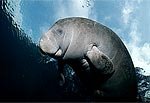Dugong are hunted for food throughout their wildlife range, usually for their meat and blubber. also, the seagrass beds which the dugong depend on for food are threatened by eutrophication caused by agricultural and industrial run off. Due to their shallow water feeding habits, dugong are frequently injured or killed by collisions with motor vessels. Because of their large size, they do not have many natural predators. They only have large ones such as sharks, killer whales and salt water crocodiles.
The US and Japanese government want to build a new base on a coral reef close to Henoko, in Nago prefecture, Okinawa. This plan has generated strong protests from Okinawans who are concerned that the local environment, home to the dugong, would be ruined.
Around the waters of Papua New Guinea, natives have been known for hunting dugongs. However, they also hunt dugong's predators, such as sharks.
The US and Japanese government want to build a new base on a coral reef close to Henoko, in Nago prefecture, Okinawa. This plan has generated strong protests from Okinawans who are concerned that the local environment, home to the dugong, would be ruined.
Around the waters of Papua New Guinea, natives have been known for hunting dugongs. However, they also hunt dugong's predators, such as sharks.
